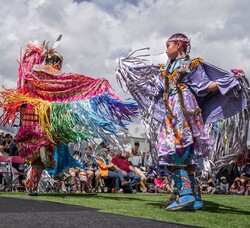National Day for Truth and Reconciliation
September 30 is National Day for Truth and Reconciliation and Orange Shirt Day.
This is a day to recognize and commemorate the legacy of residential schools, where more than 150,000 First Nations, Métis, and Inuit children were forced to attend beginning in 1920 under the Indian Act. The first residential school was established in 1831, and the last residential school closed in 1996.
This day is an important opportunity to reflect on the history and ongoing impacts of residential schools, honour Survivors, and commit to meaningful paths of reconciliation.

Honouring National Day for Truth and Reconciliation
The Town of Canmore welcomes all to gather in recognition of the National Day for Truth and Reconciliation on September 30.
Date: Tuesday, Sept. 30, 2025
Location: artsPlace (950 8 Avenue, Canmore)
Time: 12 – 3:30 p.m.

This event is in collaboration with our friends at artsPlace. Together and with our community, we will create space for learning, listening, and building stronger relationships with Indigenous Peoples and communities.
Date: Tuesday, Sept. 30, 2025
Location: artsPlace (950 8 Avenue, Canmore)
Time: 12 – 3:30 p.m.
Healing Salts Workshop — Loretta’s Wellness Circle
12 – 2 p.m.
Rooted in Indigenous teachings and ways of being, this workshop includes grounding, a land-honouring teaching, and creating a healing bath salts blend inspired by the Four Sacred Medicines, closing with optional sharing in circle. All supplies included. Space is limited (max. 15 people) — register for free here.
Ribbon Skirt Sewing Workshop with Jody Poucette
12 – 3:30 p.m.
Create your own ribbon skirt using traditional techniques, with all materials provided — just bring your sewing machine, basic tools, and some prior sewing experience. Space is limited (max. 10 people) — register for free here.
Photo Transfer Workshop with Glenna Cardinal and Tania Big Plume
12 – 3:30 p.m.
You are invited to create a takeaway photo transfer with us as we share our stories on this truth-telling day. A selection of photos will be provided.
Film Screening: 'Return to the Falls'
Opening remarks from 1 – 1:30 p.m.
Film screening from 1:30 – 2:30 p.m.
'Return to the Falls' follows Elder Betty Ross of Pimicikamak Cree Nation as she revisits her childhood experiences with resilience and healing, reflecting on the lasting impacts of residential schools. If you would like to support Truth, Healing & Education with Elder Betty Ross, please consider donating here.
Trigger warning: This film contains references to residential school trauma. Recommended for ages 10+.
Panel Discussion
2:30 – 3:30 p.m.
Community Discussion: Honouring the Children, Consulting the Nations
1 – 2:30 p.m.
Classroom, Canmore Civic Centre (902 7 Avenue)
Join this community discussion on the importance of consulting Nations when making decisions about the remains of residential school children. We will explore how to honour the children and respect the Nations in reburial and commemoration practices. Please note the location of this discussion, which differs from other programming at artsPlace.
We're looking for volunteers at our National Day for Truth and Reconciliation event on September 30 with artsPlace. If you are interested in volunteering with us, please email artsculture@canmore.ca with your name, contact details, and what role you're interested in.
| Role | Shift Time | Description |
| Parking lot support | 9:30 – 11 a.m. |
Welcoming those affiliated with the event and sharing details on where to park (in the artsPlace parking areas). |
| Feast support (private event) | 11 a.m. – 1 p.m. |
Helping to serve food to the community and Elders, clearing plates, and appropriately disposing of waste. |
| Greeters and workshop support |
Shift one: 11 a.m. – 1 p.m. Shift two: 1 – 3:30 p.m. |
Welcoming guests into artsPlace and sharing what's happening. Welcoming guests into the workshop areas and supporting the facilitators with needs such as set-up and clean-up. |
We call upon federal, provincial, territorial, and municipal governments to fully adopt and implement the United Nations Declaration on the Rights of Indigenous Peoples as the framework for reconciliation.
We call upon federal, provincial, territorial, and municipal governments to repudiate concepts used to justify European sovereignty over Indigenous peoples and lands, such as the Doctrine of Discovery and terra nullius, and to reform those laws, government policies, and litigation strategies that continue to rely on such concepts.
We call upon federal, provincial, territorial, and municipal governments to provide education to public servants on the history of Aboriginal peoples, including the history and legacy of residential schools, the United Nations Declaration on the Rights of Indigenous Peoples, Treaties and Aboriginal rights, Indigenous law, and Aboriginal–Crown relations. This will require skills based training in intercultural competency, conflict resolution, human rights, and anti-racism.
We call upon the federal government to work with provincial, territorial, and municipal governments, churches, Aboriginal communities, former residential school students, and current landowners to develop and implement strategies and procedures for the ongoing identification, documentation, maintenance, commemoration, and protection of residential school cemeteries or other sites at which residential school children were buried. This is to include the provision of memorial ceremonies and commemorative markers to honour the deceased children.
We call upon provincial, territorial, municipal, and community archives to work collaboratively with the National Centre for Truth and Reconciliation to identify and collect copies of all records relevant to the history and legacy of the residential school system, and to provide these to the National Centre for Truth and Reconciliation
